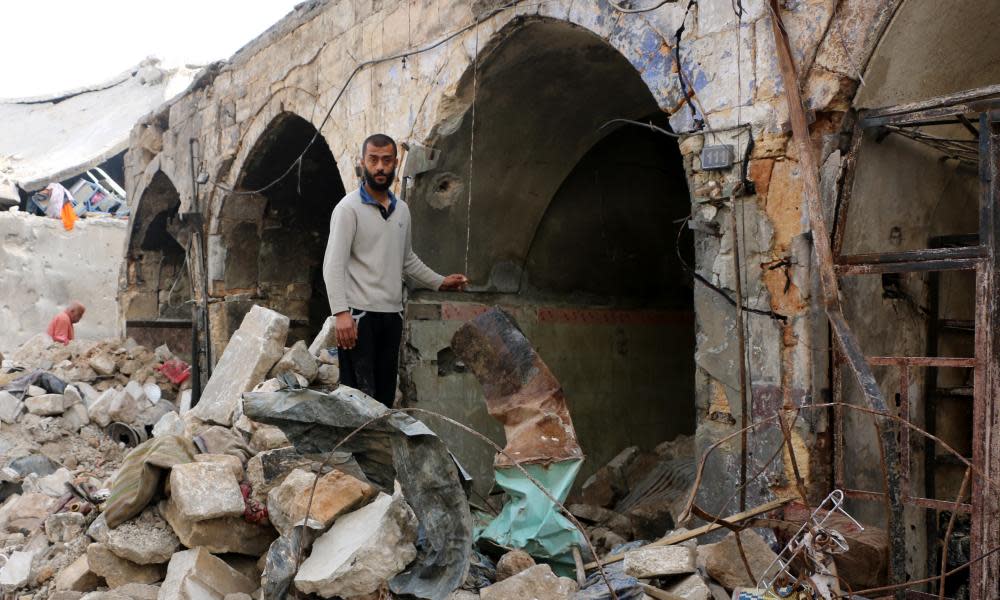Australia condemns Syria at UN and pushes back against Russia

Australia has fiercely condemned the Syrian government for its continuing atrocities against civilians, which have included bombing hospitals, using illegal chemical weapons and deliberately trying to starve a civilian population, in a statement to the Human Rights Council in Geneva.
And Australia has pushed back firmly against Russia, which has tried to soften criticism of the Syrian regime.
A resolution condemning the Syrian regime was passed by the council 27 votes to 4 – with 16 abstentions – saying Syria’s actions probably “constitute war crimes and crimes against humanity” and again urging that a 30-day ceasefire be upheld.
The vote came shortly after a new ceasefire deal was brokered that could allow the evacuation of tens of thousands of civilians and fighters from the besieged enclave of Eastern Ghouta under guarantees from Syria’s ally Russia.
The charge d’affaires of Australia’s mission to the UN in Geneva, Lachlan Strahan, told the council “it is clear the human rights are being systematically violated in Syria”.
“The use of chemical weapons, indiscriminate weapons, attacks on hospitals, denial of humanitarian access, attacks on civilians, the use of siege and starvation tactics, the persecution of minorities, and a disturbing level of impunity for wrongdoing have been tragic hallmarks of this conflict.”
Systematic airstrikes by Russian and Syrian forces on the rebel-held Eastern Ghouta, just outside Damascus, have killed up to 1500 people in a month.
Up to 400,000 people were trapped in the city, which had been besieged for five years, and had faced sustained bombardment over weeks. In recent days thousands of people have fled through Russian-created “humanitarian corridors”, but tens of thousands remain.
Strahan called for all sides in the conflict to seek a political solution as quickly as possible, “without which, the suffering will continue”.
The Russian Federation, not a member of the Human Rights Council, suggested amendments to the council’s statement on Syria, which softened condemnation of the regime and sheeted home blame for the violence to “terrorists in the Syrian Arab Republic”, including Islamic State and the Al-Nusrah Front. The US said Russia’s last-minute amendments “make a mockery” of council processes.
“Australia opposes the amendments submitted by the Russian Federation,” Strahan told the council. “We are concerned that these amendments will weaken this important text.”
Daniel Webb from the Human Rights Law Centre, an observer to the Human Rights Council session, said Australia was at the forefront of the push to defeat the Russian amendments.
“Victims of cruelty and injustice all over the world need governments like ours to form part of the UN’s principled spine. This kind of action and straight-talking is vital.”
Webb said Australia’s firm position on human rights must extend to its own region as well.
“As well as rightly and strongly criticising far-away regimes, our government must also be prepared to speak some hard truths to its neighbours.”
In recent days at the council session, Australia said it was concerned by Cambodia’s repression of political dissent, and by increasing hate speech and violent attacks against religious minorities in Sri Lanka.
The lead-up to July’s election in Cambodia has been marred by increasing political violence, the dissolution of the main opposition party, and the jailing of its leader on spurious charges of treason.
“We continue to be deeply concerned by the narrowing of the democratic space in Cambodia through actions that restrict opposition parties, civil society and the media,” Strahan said.
“It is troubling that the leader of the now-dissolved main opposition, Kem Sokha, remains in detention. The February 2018 Constitutional amendments and the new lèse majesté provision further undermine human rights in Cambodia.”
The Cambodian leader, Hun Sen, visited Sydney last weekend, and met the prime minister, Malcolm Turnbull, as part of the Asean-Australia summit. Hun Sen’s presence in Australia drew significant protests.

 Yahoo News
Yahoo News 
